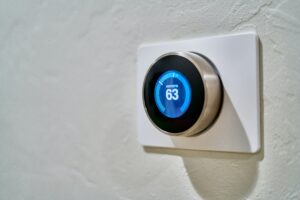By Sharon Marciniak (Bloudek), July 7, 2020
 If you’ve bought or sold a home in the last year or two in the city of Portland, or if you’ve just cruised real estate listings online for fun (I know—I do it, too!), you have probably noticed “HES” accompanied by a number in the home descriptions. “HES” stands for “Home Energy Score.” Beginning in 2018 in Portland, sellers of single-family homes are required to obtain and disclose a Home Energy Report.
If you’ve bought or sold a home in the last year or two in the city of Portland, or if you’ve just cruised real estate listings online for fun (I know—I do it, too!), you have probably noticed “HES” accompanied by a number in the home descriptions. “HES” stands for “Home Energy Score.” Beginning in 2018 in Portland, sellers of single-family homes are required to obtain and disclose a Home Energy Report.
What information is included in a Home Energy Report? This report provides valuable estimates of a home’s energy use and costs and provides cost-effective solutions that improve a home’s efficiency. And what is the point of this, you might ask? In practical terms, it helps future homeowners to avoid surprises like outrageous heating bills the first winter. More broadly, it encourages homeowners to maintain an energy-efficient home—and our collective efforts can have a large positive environmental impact click here for more information on how maintain an energy efficient home.
If you’re buying or selling a home then, it’s important to educate yourself about home energy efficiency. However, it’s just as important for homeowners who have every intention to stay put to take steps to improve their home’s efficiency. It’s good for the environment—and it puts money back in your pocket in the form of reduced energy usage and lower utility bills! Read on for actions you can take to improve your home’s energy efficiency:
- Ghost Power. Pop quiz: how many cell phone chargers are plugged into a wall outlet in your house without a smartphone attached to the other end?! I’m guilty of this. You are too—don’t try to pretend otherwise! In fact, in the average home, there are electric items all over the place sucking up power when they’re not being used: coffeemakers, toasters, televisions, lamps. You get the idea. The solution? A simple power strip. Well, a simple power strip + a bit of effort in training yourself to flip the power strip switch to off after you’ve brewed coffee and toasted a bagel in the morning. Sure, it might take some time to save enough energy to pay for the power strip. I have a vague recollection of a bin of random, unused cords and power strips in my garage, however—and that means that with $0 and about 20 minutes of effort, I can easily reduce my home’s energy usage.
- Lightbulb Moment. When LED lightbulbs first came on the market, they were expensive—really expensive. And they weren’t that attractive, to be honest. The average cost of an LED bulb has come down over the years, and the options have expanded so that there is an LED option for nearly every type of lighting fixture. Plus, an Energy-Star rated LED bulb can save you up to $75/year in energy costs. These bulbs use much less energy and last significantly longer. If you don’t want to drop dough to replace every single bulb in your house at once, then commit to replacing your standard incandescent lightbulbs with LEDs as the incandescent bulbs burn out!
- Smart Heating and Cooling. We installed a smart thermostat a couple of years ago. At first, I felt a little like a future-living Jetson, but when we arrived back in Oregon to near-freezing temperatures following a trip to balmy Southern California, we were able to turn up the heat via smartphone as soon as we landed at PDX and walk into our warm, snug house an hour later. However, a smart thermostat does far more for you. You can program your heating and cooling systems to operate when you need them—and to power down when you don’t, adding up to big savings.
- Furnace filter. Out of sight, out of mind. Changing the furnace filter is not a task that usually makes it onto my to-do list. At least, it wasn’t until I learned that this simple chore drastically increases furnace efficiency—which means my house is warmer and my gas bill is lower. Here’s what you do: first, go look (right now!) to see what size furnace filter your furnace needs. Next: open the calendar on your phone; set a reminder to change the furnace filter on September 1st, December 1st, and March 1st. (Experts say that you should replace the filter every 4 months, but here in Oregon, our heat is usually off by mid-May, so I cheat as the weather warms up. Check your owner’s manual and follow the recommendations!) In your calendar, make a note of the filter size so you don’t find yourself guessing at the hardware store. (Pro tip: order a multi-pack of filters so you always have extras on hand.) You should also consider having your furnace assessed and serviced before cold weather kicks in again—an important home maintenance task that will help to keep your home’s heating system running efficiently.
- Seal the leaks. Do you live in a Goldilocks home that always feels too cold or too warm—never “just right.” Chances are, air leaks are to blame. Air leaks occur in those little (and sometimes not-so-little) cracks and gaps around your home—around doors and windows, in attics and crawl spaces, and even where wires and pipes enter your home from the main lines. Some of these air leakage areas might be easily identifiable (and easily fixable). For example, if you can see daylight around the edges of an exterior door, it’s probably time to replace the weather stripping for a tighter seal—an inexpensive and fairly simple DIY project. For help identifying areas of greater concern, consider investing in a professional home energy audit.
- Appliance usage. Around my house, the laundry and dishes pile up fast, especially now that we’re home so much more. While we try to stay on top of the mess, we wait until later in the evening—after peak usage hours—to run the dishwasher and washing machine. This simple change to our daily household routine means that we’re doing our part to reduce the strain on the energy grid.
- Smart appliances. Of course, running appliances in non-peak hours has a limited impact if the appliances themselves are inefficient. As you update old, out-of-date appliances in your home, be sure to look for Energy Star appliances. Bonus: many Energy Star appliances come with significant rebates!
- Give it a rest. “It” being your computer, of course. The soft glow of your laptop monitor is not a good nightlight. When you’re done working for the day, put your computer to sleep (or power it off entirely!). This simple practice saves energy, but has the added benefit of helping you to mentally end your workday—a good practice, especially for those who are still adjusting to working from home!
There are dozens of other ways to increase your home’s energy efficiency. More and more homeowners are installing solar panels to generate electricity, installing low-flow showerheads and toilets to minimize water usage, and more. Assess your home (or have a professional do it!), make a to-do list and prioritize the items on it, and take the first step toward a greener, more efficient home. As always, I’m here to help with recommendations and referrals!
Sharon Bloudek, Licensed in the State of Oregon
503-701-1000 (mobile)
